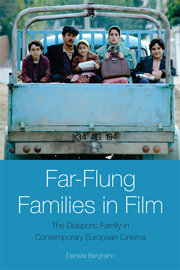Book contents
Introduction
Published online by Cambridge University Press: 05 September 2013
Summary
In the popular Turkish German comedy, Almanya – Willkommen in Deutschland (Almanya – Welcome to Germany, Yasemin Samdereli, 2011), Cenk, the seven-year-old grandson of the Turkish family shown on the cover of this book, is rejected by both the German and the Turkish football teams at his school because, as the son of a Turkish German father and a German mother, he does not qualify for either side. He picks a fight, comes home bruised and beaten, and then, when the entire extended Yilmaz family are gathered round the dinner table, comes out with the all-important question: ‘So what are we? Turks or Germans?’ Nobody knows for sure. Cenk's grandparents, who had left their Anatolian Heimat on the back of a sky-blue pick-up truck more than forty years before to go in search of a more prosperous life in Germany, have just acquired German citizenship and German passports but, paradoxically, also a home in their homeland. Cenk's father Ali speaks hardly any Turkish and is, in most respects, far more German than his blond and blue-eyed German wife. And so Cenk has to make do with the seemingly unsatisfactory answer: ‘You can also be both’.
Cenk's innocent question raises the complex issue of belonging that, in some form or other, underpins all of the films about diasporic families in this book. As the heated debate that ensues amongst the Yilmaz family illustrates, memories of migration and an enduring attachment to the original homeland result in a diasporic consciousness, which feeds on nostalgic memories of the homeland and on ‘the dream of a glorious home-coming’ (Naficy 2001: 229).
- Type
- Chapter
- Information
- Far-Flung Families in FilmThe Diasporic Family in Contemporary European Cinema, pp. 1 - 17Publisher: Edinburgh University PressPrint publication year: 2013

